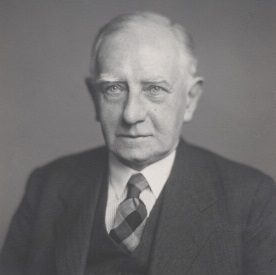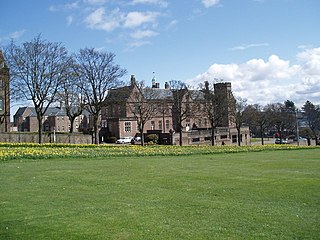
Norman Duncan Kemp Smith, FBA, FRSE was a Scottish philosopher who was Professor of Psychology (1906–1914) and Philosophy (1914–1919) at Princeton University and was Professor of Logic and Metaphysics at the University of Edinburgh (1919–1945).

Narendra Babubhai Patel, Baron Patel, is a Tanzanian-British obstetrician and cross bench peer, and a former Chancellor of the University of Dundee.
Dundee is the fourth-largest city in Scotland with a population of around 150,000 people. It is situated on the north bank of the Firth of Tay on the east coast of the Central Lowlands of Scotland. The Dundee area has been settled since the Mesolithic with evidence of Pictish habitation beginning in the Iron Age. During the Medieval Era the city became a prominent trading port and was the site of many battles. Throughout the Industrial Revolution, the local jute industry caused the city to grow rapidly. In this period, Dundee also gained prominence due to its marmalade industry and its journalism, giving Dundee its epithet as the city of "jute, jam and journalism".

Susan Margaret Black, Baroness Black of Strome, is a Scottish forensic anthropologist, anatomist and academic. She was the Pro Vice-Chancellor for Engagement at Lancaster University and is past President of the Royal Anthropological Institute of Great Britain and Ireland. From 2003 to 2018 she was Professor of Anatomy and Forensic Anthropology at the University of Dundee. She is President of St John's College, Oxford.
Sir Thomas Malcolm Knox was a British philosopher who served as Principal of St Andrews University from 1953 to 1966 and Vice-president of the Royal Society of Edinburgh from 1975 to 1978.
Harold James Plenderleith MC FRSE FCS was a 20th century Scottish art conservator and archaeologist. He was a large and jovial character with a strong Dundonian accent.
David Alexander Syme Fergusson is a Scottish theologian and Presbyterian minister. Since 2021, he has been Regius Professor of Divinity at the University of Cambridge.
Sir Kenneth John Wilson Alexander was a Scottish economist and university administrator. He also had strong links to the Scottish steel and shipbuilding industries.

Dundee Royal Infirmary, often shortened to DRI, was a major teaching hospital in Dundee, Scotland. Until the opening of Ninewells Hospital in 1974, Dundee Royal Infirmary was Dundee's main hospital. It was closed in 1998, after 200 years of operation.
James Drever FRSE (1910–1991) was a Scottish academic who served as the first Principal of the University of Dundee. He has been described as 'one of the most pivotal figures in the university's history'.
Annabelle "Anna" Frances Glasier OBE, FFSRH, FRCOG FRSE is an English physician in the field of reproductive medicine. Glasier is a world expert on emergency contraception, and her work has been instrumental in making it available in the UK and other countries without medical prescription

King's Cross Hospital, often shortened to King's Cross is a hospital in Dundee, Scotland. It is managed by NHS Tayside.

Douglas Samuel Jones MBE, FRS, FRSE was a mathematician and electrical engineer known for his works in the field of electromagnetism.

Edith Philip Smith FLS FRSE was a botanist and teacher who became a fellow of the Royal Society of Edinburgh and Head of the Botany Department at Queen's College, Dundee.
Robert Campbell Garry, OBE, FRSE, was a British physician and Professor of Medicine at the University of St Andrews and the University of Glasgow. During World War II, as an expert on human physiology, he advised on human tolerance of extreme weather conditions and forces, as experienced by high altitude pilots.
Sir Charles Peter Downes, known as Pete Downes, is a British biochemist and chairman of Dynamic Earth in Edinburgh. Downes served as Principal and Vice-Chancellor of the University of Dundee from 2009 until 2018. He is the former Head of the College of Life Sciences and co-founder of the Division of Signal Transduction Therapy (DSTT) alongside Sir Phillip Cohen. Having contributed to research in the pharmaceutical industry for eleven years prior to joining Dundee, he is one of the top 15 most cited bio-scientists in the UK.

Sir Ian George Wilson Hill was a Scottish physician. He was President of the Royal College of Physicians of Edinburgh from 1963 to 1966 and the official Physician to the Queen in Scotland. He was Chairman of the British Cardiac Society.
John Iball FRSE FIP (1907–1993) was a British physicist and crystallographer. He made major advances in cancer research. He gives his name to the Iball Index: the relative potency of carcinogenic compounds.
Alexander David Peacock FRSE (1886–1976) was a 20th-century British zoologist.
James Frederic Riley FRSE FRCSE was a 20th-century English physician, radiologist and cancer specialist. His identification that the mast cell was the main producer of histamine in the human body resulted in his being made a visiting professor at the University of Montreal and to his being awarded the Claude Bernard Medal for medical achievement. He was one of the first to identify the link between mast cells and asthma and the potential use of antihistamines in this field.







